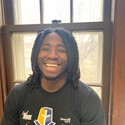An Interview with Retiring Professor, Dr. Jamie Sullivan
March 26, 2024
I interviewed MMU Professor Dr. Jamie Sullivan so I could learn some of his thoughts on English class and English students from a teacher perspective. The first question I asked him was, what inspired you to be an English teacher, was it always your goal, or did you have a different goal in mind? His response surprised me.
“The truth is that I was about to graduate from college and had no idea what I was going to do. I went to Creighton University which, much like most universities, has a Graduate Teaching Fellowship. I knew a guy that was doing that for English, and I found out more about it and he told me to ‘give that a try.’ I liked it immediately, and that’s pretty much all I’ve done since then. It was kind of an accident. I was months away from graduation, and I had no idea what I was going to do. I hadn’t thought about teaching at all, and there I was teaching “Introduction to Fiction” at Creighton only three months after I graduated. It all worked out.”
Dr. Reese is always telling us to read—to read everything: cereal boxes, instructions, books. How does one become a better writer?
“To be a good writer you have to read and, at some point, start to analyze how other writers work. There are more and more people that can write with power, convince people, or touch people’s hearts. However, there are a few flashing bulletins saying ‘writers needed here.’ Writers are as important as ever. Think about going to law school; law is mostly a matter of reading comprehension and being able to write clearly. Or think about this: you never see anything on the screen—a movie, documentary, tv show, or commercial that hasn’t been written. Script writing is invaluable. There are all kinds of jobs that require writing skills, though they are not always visible. Writing is a very valuable skill, so good writers have all kinds of opportunities.”
Why is an English major important?
“The skills an English major develops would be valuable to almost anyone. But, of course, students are worried about jobs. If you major in nursing, you know exactly what jobs you will be applying for. If you major in English, it’s not always so clear, but there’s lots and lots of options. There was an article in the New Yorker recently titled The Death of the English Major that was, in part, a discussion of AI. The thing is, you know how to write well, think things through as a writer, and artificial intelligence doesn’t think things through. It’s not thinking; it’s picking up patterns of words that are associated with each other, but it’s not thinking.”
Ask ChatGPT what it likes about Dostoevsky’s Crime and Punishment and you get an amalgam of what people have thought. You might as well ask why it loves its mother. Another area that’s in high demand now, because of the internet, is content creation. English majors who will teach also have to learn to work with people, a very important skill. I don’t think somebody can be a good teacher if he/she simply doesn’t like to talk and interact with people. One of the real magical moments that happens in teaching is when you see students catch on to something that they hadn’t noticed before and sometimes join in on that. You start to realize that you are discovering things together.”
What’s the best excuse you’ve gotten about a student missing class?
“I once got a message from a student saying he couldn’t make it to class because he and his friend were tracking a deer.”
Any advice for future writers?
“Quit thinking about writing. Instead, write. Make it a routine, whether you think of anything worth saying or not. Robert Pirsig in his memoir Zen and the Art of Motorcycle Maintenance describes asking a writing class to spend an hour describing their thumbs. Without being able to think of any clichés, they sure are forced to look very carefully at their thumbs. It’s a good exercise in learning to notice parts of the universe routinely overlooked.”
Can you tell us how long you’ve been at MMU and your plans for the future?
“This is my fifty-something year of college/university teaching and my 39th year at Mount Marty. Retirement will allow more time to write that poem about my thumb. There are a few hundred thousand books I haven’t read and I have thought about exploring Central America, maybe starting with Costa Rica. If that doesn’t work out, the Ozarks is full of rivers, springs, caves, and creatures I have not yet seen.”
-
I have never taught a Jane Austen novel without two or three students falling in love with her work.
-
Many students have told me they stayed up all night reading Allen Eskens’ thriller The Life We Bury.
-
Most students enjoy Jeannette Walls’ The Glass Castle.
-
Frankenstein is still a hit. Students are often surprised by the odd narrative structure of the book.
-
Sherman Alexie’s Absolutely True Diary of a Part-Time Indian is a favorite.
-
Many students are deeply moved by Khaled Hosseini’s A Thousand Splendid Suns.
- The Warmth of Other Suns, Isabel Wilkerson (non-fiction)
- Killers of Flower Moon, David Grann (non-fiction, shorter than the movie)
- Ulysses, James Joyce
- The Sound and the Fury, William Faulkner
- The God of Small Things, Arundhati Roy
- The Shipping News, Annie Proulx
- All the Pretty Horses, Cormac McCarthy
- The Tin Drum, Günter Grass
- Bright Dead Things, Ada Limón (poetry)
About David Phillips
David is a junior at Mount Marty University. He is an English major and an Art minor and is running on the cross country and track team. He comes from a small town, Crofton, Nebraska. He is a fan of video games, music, pro wrestling, and spending time with the people he cares about. All his life, he has wanted to tell peoples' stories.







